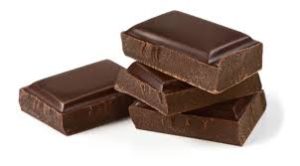 A wacky study in some ways, but the results give another great reason to eat dark chocolate ("It's for my vision") if the results hold up with more research. Unfortunately the milk chocolate used did not have the same beneficial effects for vision (it just had no effect). But still to be determined is how long does the small increase in vision acuity and contrast sensitivity last after eating dark chocolate, and does it really mean anything in the real world? The beneficial results in vision were found about 2 hours after eating the dark chocolate, so it is unknown how long the beneficial effect lasted.
A wacky study in some ways, but the results give another great reason to eat dark chocolate ("It's for my vision") if the results hold up with more research. Unfortunately the milk chocolate used did not have the same beneficial effects for vision (it just had no effect). But still to be determined is how long does the small increase in vision acuity and contrast sensitivity last after eating dark chocolate, and does it really mean anything in the real world? The beneficial results in vision were found about 2 hours after eating the dark chocolate, so it is unknown how long the beneficial effect lasted.
The good news is that in the study 30 healthy adults were randomly assigned to different groups, it was "double blind" (no one knew who got what to eliminate bias), it was rigorously done, they used real chocolate available to everyone (72% Cacao Dark Chocolate bar vs Crispy Rice Milk Chocolate bar - both from Trader Joe's), and the researchers had no ties to industry. The researchers concluded eating a "dark chocolate bar improves the ability to see low- and high-contrast targets, possibly owing to increased blood flow", but they don't know what this means for real life.
As the researchers point out - there were 8 times more flavanols in the dark (316.3 mg) vs milk chocolate bar (40 mg). Their thinking was clear in the study's introduction: "Several studies suggest that dark chocolate from favanol-rich cacao beans may enhance blood flow to central and peripheral nervous systems, improve cardiovascular function, and retard memory loss and other signs and symptoms of degenerative diseases, including Alzheimer and Parkinson diseases. The cacao flavanols in dark chocolate have antioxidant effects that retard and partially reverse degenerative changes in various diseases. Dark chocolate consumption also has been associated with enhanced mood and cognition." Wow.
The big question: How much dark chocolate did they eat to get these beneficial effects? Answer: 47 grams (or 1 serving, 280 calories) of the 72% cacao dark chocolate. From Medical Xpress:
A bit of dark chocolate might sweeten your vision
It may not replace prescription glasses, but a few bites of dark chocolate might offer a slight and temporary bump up in vision quality, new research suggests. Heart-healthy compounds in chocolate called flavanols appeared to sharpen eyesight for a group of 30 healthy young adults in the new study. The observed change in vision was small, but significant. However, the study authors stressed that it's too early for ophthalmologists to recommend chocolate as medicine for the eyes.
"The duration of these effects and their influence in real-world performance await further testing," said a team led by Dr. Jeff Rabin of the University of the Incarnate Word in San Antonio, Texas. His team published its results online April 26 in JAMA Ophthalmology.
As Rabin's team explained, there's been evidence in prior studies that the antioxidant flavanols in dark chocolate might help boost blood flow to the nervous system, boost heart function and even help preserve the aging brain. So, the investigators wondered if the eyes might reap some sort of benefit from chocolate, too.
To find out, the researchers had 30 healthy adults, averaging 26 years of age, eat either a 1.5-ounce Trader Joe's 72 percent Cacao Dark Chocolate bar or a similar-sized Trader Joe's Crispy Rice Milk Chocolate bar. Labels were removed from each bar so participants didn't know what type of chocolate they were eating. About two hours later, each participant underwent vision testing using standard letter-based eye charts.
The result? Compared to people who'd eaten the milk chocolate bar, those who'd snacked on the dark chocolate showed "small enhancements in visual acuity and large-letter contrast" on the vision test, the researchers reported.
Dr. Mark Fromer is an ophthalmologist at Lenox Hill Hospital in New York City. He explained that visual acuity is a key component in the standard eye-glasses prescription test, where patients "specifically identify the letters on the eye chart." And contrast sensitivity is "the ability to distinguish an object as the lighting is altered in intensity," said Fromer, who wasn't involved in the new study.
